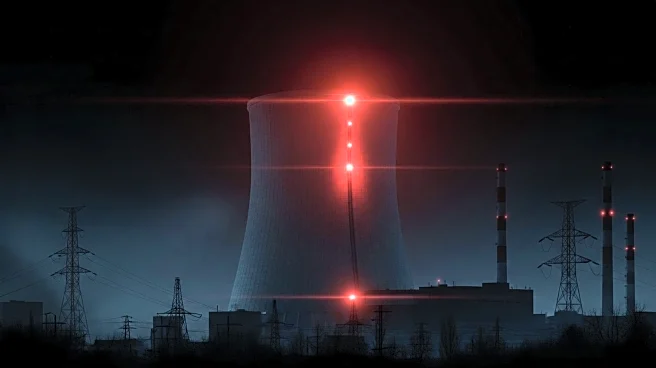What's Happening?
The Zaporizhzhia nuclear power plant in Ukraine, currently under Russian control, has been without external power for several days, raising significant safety concerns. The plant, which is Europe's largest, has been occupied by Russian forces since March 2022, following President Putin's invasion of Ukraine. The current outage is the longest recorded during the ongoing conflict, prompting fears of overheating and a potential nuclear meltdown. Ukrainian officials have accused Russian shelling of causing the power cut, although Russia has not confirmed this. The plant relies on external power for cooling and safety systems, and the United Nations reported that the final power line was cut earlier this week. Emergency diesel generators are currently being used to maintain operations, but these are considered a last resort. The International Atomic Energy Agency (IAEA) is in contact with both sides to facilitate the restoration of power.
Why It's Important?
The prolonged power outage at the Zaporizhzhia nuclear plant poses a significant risk to nuclear safety, with potential consequences similar to the Fukushima disaster in Japan. The plant's operational status is crucial, as it previously supplied about one-fifth of Ukraine's electricity. The situation highlights the vulnerabilities of nuclear facilities in conflict zones, raising broader concerns about nuclear safety and security. The ongoing conflict has displaced millions and resulted in numerous casualties, further complicating efforts to ensure the plant's safety. The IAEA's involvement underscores the international community's concern over the potential for a nuclear incident, which could have far-reaching environmental and geopolitical implications.
What's Next?
The IAEA Director General Rafael Grossi has met with Russian officials to discuss nuclear safety at the Zaporizhzhia plant, but the situation remains unchanged. The plant continues to rely on diesel generators, which have limited fuel reserves. The IAEA is working to restore external power as soon as possible, but the timeline for resolution is uncertain. Ukrainian officials are demanding the return of the plant to Ukrainian control, emphasizing the risks posed by its current status. The international community is closely monitoring the situation, with potential diplomatic efforts to address the crisis and prevent further escalation.
Beyond the Headlines
The crisis at the Zaporizhzhia nuclear plant highlights the broader issue of nuclear safety in conflict zones. The situation raises ethical and legal questions about the use of nuclear facilities as strategic assets in warfare. It also underscores the need for international frameworks to protect such sites and prevent their exploitation during conflicts. The potential environmental impact of a nuclear incident could have long-term consequences for the region and beyond, affecting public health and ecological systems. The crisis serves as a reminder of the delicate balance between energy security and safety in the context of geopolitical tensions.









